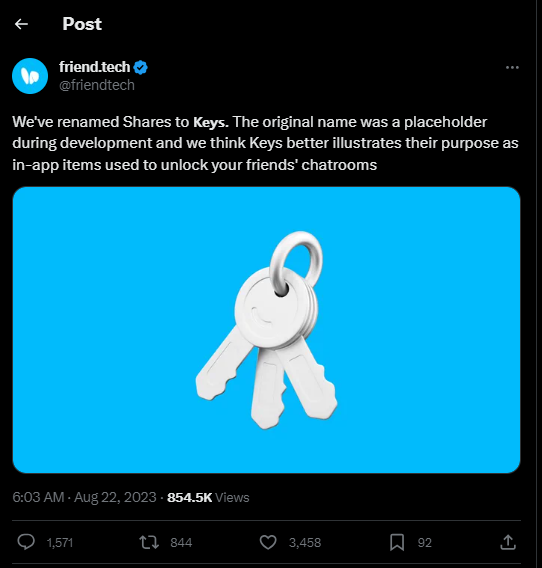Some fervent admirers of the August 2023-launched cryptocurrency network Friend.tech praise it as the first significant success in the social cryptocurrency sector. The company allegedly generated over $25 million and added over 100,000 users in the first two weeks after introduction. Its early extinction was reported after that, which was then followed by a remarkable rise in popularity.
Blockchain technology is used by social token-driven platforms to enable users, including individuals, brands, and companies, to build and monetize online communities. Supporters see social tokens as a likely major factor in Web3 growth and a critical means of attracting newcomers to the cryptocurrency space. Social tokens enable influencers, producers, and others to monetise a fan base in return for exclusive deals and content. They do this by fusing elements of conventional cryptocurrencies with patronage networks.
Friend.tech’s beta launch is only getting started, but curious people are already looking around for invite codes. But what is this new platform for social cryptography and how does it function?
Users can buy and sell “keys” (previously known as “shares”) that are linked to Twitter (now X) accounts, which grant access to private in-app chatrooms and exclusive content from that X user. Friend.tech bills itself as “the marketplace for your friends.”

On the app, each user has a chat group similar to those on platforms like Telegram. The catch is that in order to access other users’ private chats, users must acquire keys. If they choose to leave the conversation, they can subsequently opt to sell those keys.
This makes Friend.tech comparable to a social media site, or perhaps more precisely, a subset of X. Popular Twitter users have had prior success (and occasionally legal issues) selling coins that they either created themselves or were compensated to promote. These people occasionally used links to unique material to promote the sale of these tokens.
Like many other recent social media platforms, it requires users to have an invite code in order to join. This has helped to contribute to a highly competitive landscape in which eager would-be adopters search for codes, aiding in the promotion of the platform in the process. Friend.tech takes this pre-existing aspect of Twitter and fleshes it out with a set of standardized crypto platform features, including airdropped rewards, fee sharing, and more. Once within the program, a new user bridges ether from Arbitrum to the basic wallet address and joins their Google and X accounts. They are now prepared to start trading keys and taking part in private conversations.
A browser-based application called Friend.tech was created on the Base network, an Ethereum scaling network made available by cryptocurrency exchange Coinbase.
Quick Growth
The social token platform Friend.tech is not the first to garner a lot of interest. comparable efforts were made in the latter half of 2022 by a platform named Roll, which sought to give users access to the on-chain capacity needed to support subscriber tiers comparable to those offered by the well-known Web2 site Patreon.
But Friend.tech’s expansion has outpaced that of other social token platforms. Two weeks after its debut, Friend.tech reportedly made $1 million in fees, or 5% of each transaction’s value, in a single 24-hour period. After deducting petrol prices and other expenses, that amounts to a profit in ether of more than $700,000.
And in a similar amount of time, Friend.tech has already paid some of its top earners a sizeable sum. Particularly among the top passive earners, influencers in esports have climbed quickly through the rankings, making tens of thousands of dollars apiece in a matter of days. Each time a user’s private chat keys are purchased or sold, they get fees.
Participants in the Friend.tech ecosystem have an extra motivation since users who are labeled as “creators” (as opposed to “followers”) see crucial prices rise as their networks get bigger. The makers gain from this since they receive greater incentives in the form of payments. But if they decide to sell their keys, presuming they have increased in value since they were initially bought, it also helps their followers. The idea of a bonding curve is used to calculate the cost of keys.
Possible issues
Others in the crypto world could be wary of Friend.tech for a variety of reasons. One, there is a strong possibility for manipulation of different types, as with any relatively new crypto network. Users need to be cautious while considering offers that look unreal.
The fact that Friend.tech underwent a rebranding and redesign just a few months before the beta launch is another facet of the service that could cause some prospective customers to hesitate. The site was previously known as Stealcam, a “steal to reveal” system that allowed users to sell selfies and other photographs.
Sustainability is more of an issue for Friend.tech’s anonymous founders. In reality, a co-founder by the name of Racer told Decrypt that the platform’s first launch was only meant to be used for load testing, hence the fact that it became popular as a result was unexpected. Over the past two weeks, there has been a frenzied scramble to attempt to grow the platform’s infrastructure and solve problems as they arise.
Others have compared the rapidly expanding platform to a Ponzi scheme, pointing out that if you invest in one user’s keys and other investors do as well, the value of those keys increases. There is a belief that by directly and solely correlating the worth of keys to the number of investors in those keys, the system would eventually collapse, causing a rush to sell keys. Others have argued that the platform might not succeed since there isn’t a strong incentive for people to utilize it long-term.































